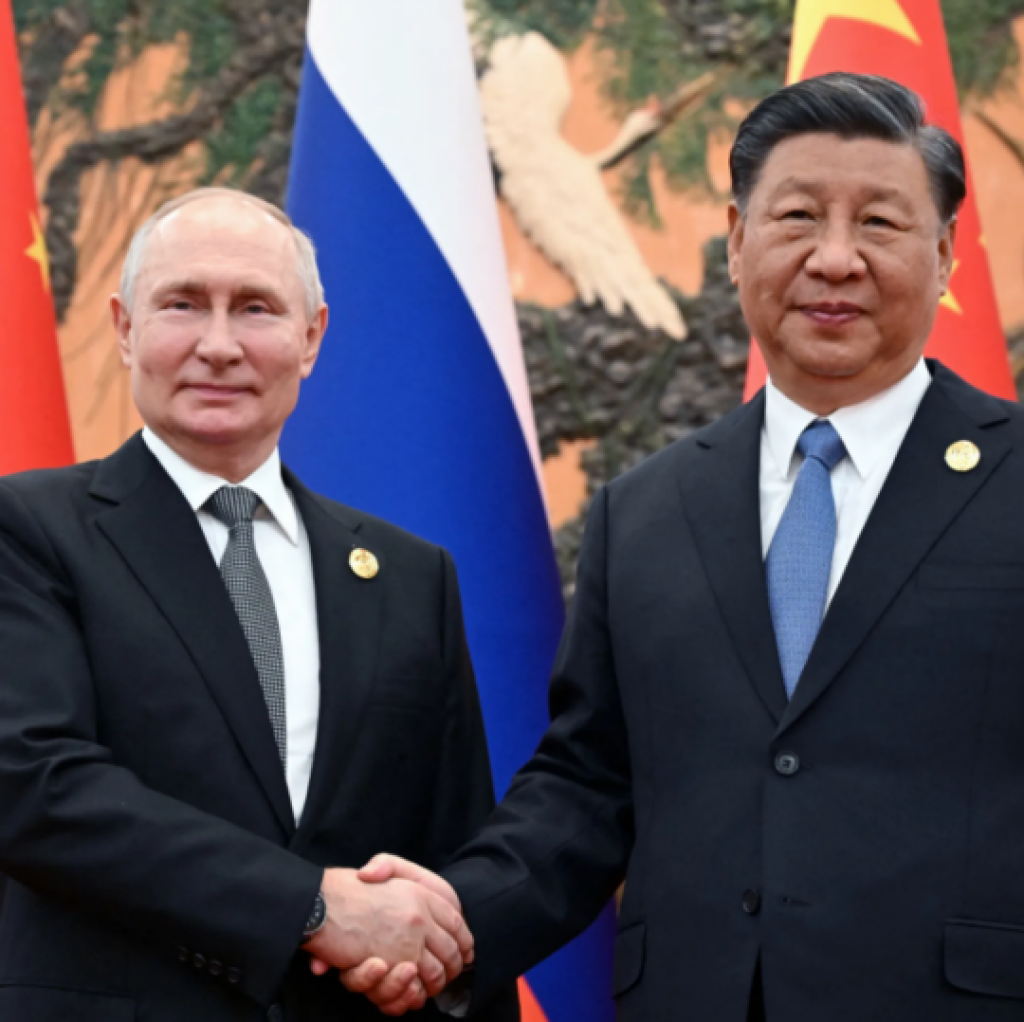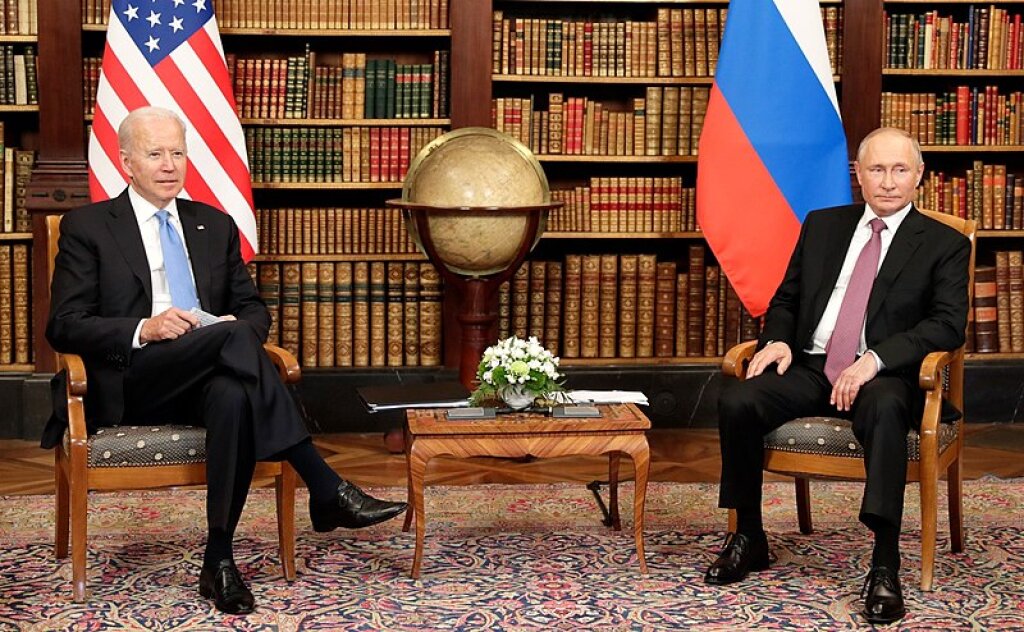Lutgard Lams teaches Media Discourse Analysis and Intercultural Communication at KU Leuven and specializes in Chinese and Taiwanese official discourses. She heads the Brussels Center for Journalism Studies (BCJS), and is a member of MIDI (Multimodality, Interaction, and Discourse).
Hedwig de Smaele is program director of the Master of Journalism at KU Leuven. As a member of BCJS she has published on Russian information culture, Russian media and democracy and normative theories applied to Russia.
Since the publication of our article on the similarities between the Chinese and Russian narratives on NATO, the convergence between the rhetoric and the underlying ideologies and political aims of both countries’ leaders has become increasingly clear. Not only did the two nations seal their strong relationship with a joint statement in February 2022 that announced a “no limits” strategic partnership and included a long list of concerns about the United States, but also, their actions beyond the discursive level appear to “walk the walk,” so to speak.
For example, Moscow and Beijing have been strengtheningmilitary cooperation to project power against other countries like Japan. A certain level of distrust between China and Russia still remains, in that neither wants to be overly dependent on the other. Over the last few years, however, the overt Sino-Russian convergence has confirmed the results of our study into their discourses on the Self and the foreign Other.
Having sporadically noticed similarities between official Chinese and Russian discourses on the foreign Other, in 2018 we pooled our expertise on each respective discourse. Our special focus was the Chinese and Russian press narratives about NATO around the time of the 2016 NATO Summit in Warsaw, which occurred in the aftermath of Russia’s annexation of Crimea in 2014.
A comparative analysis of the newspaper accounts revealed an ideological rapprochement between the two powers. The results indicated a growing fear of containment by Western forces, combined with a sentiment of moral superiority over Western political actions and beliefs about governance styles. In view of this discursive alignment between China and Russia on issues of global governance and their negative views on the Western role in the global order, the public announcement of their “no-limits” strategic partnership was hardly surprising. Rather, it confirmed our findings of a friendship years in the making.
There was only one catch: due to the lengthy production process associated with peer-review journals, our article did not come out until the end of 2022—long after the start of Russia’s full-scale invasion of Ukraine in February of that year. History had thus caught up with our anticipatory message about the growing “anti-hegemonic” coalition between Russia and China. And yet, the actual conditions that had placed both global players in the global geopolitical spotlight only reinforced the gist of our article.
Since the start of the war in Ukraine, the Russian and Chinese positioning vis-à-vis the West has only become more antagonistic—to the point that observers have argued that the world is in a second Cold War. As former US diplomat Zbigniew Brzezinski had warned in 1997: “potentially, the most dangerous scenario would be a grand coalition of China, Russia, and perhaps Iran, an ‘antihegemonic’ coalition united not by ideology but by complementary grievances.”
China has recently blamed the West for this new Cold-War mindset. Yet Chinese diplomats and government spokespeople have, on numerous occasions, deployed so-called “Wolf-Warrior” language that belies the outwardly benign discourse of multilateralism and a harmonious “community of common destiny for humankind.” This new belligerence has been evident ever since China started claiming its “discourse right” under former president Hu Jintao.
Since Xi Jinping assumed office in 2012, he has made no secret of his intention to transform the current system of global governance and install a more equitable world order. It is in the context of these goals that the China-Russia bond takes shape. While anti-Western rhetoric was already obvious in rhetoric surrounding the 2016 NATO Summit, perceptions of increased mutual threat have since amplified, inducing both countries to reinforce ties with allies who share their apprehension about Western dominance. Western support of Ukraine and NATO expansion has only exacerbated these concerns, both in Russia and China, triggering a further resolve to build stronger alliances that would exclude Western countries. Indeed, Russia, China, and other powers like Iran have been teaming up to reshape the world, while multilateral institutions like the SCO and BRICS are attracting new members from all over the developing world.
Both Moscow and Beijing nostalgically long for a restoration of their erstwhile imperial power. In aggregate, Russia’s invasion of Georgia (2008), annexation of Crimea (2014), and war on Ukraine (2022) indicate its longing for a return to tsarist-style expansionism. Nowhere is Russia’s perspective on regional order clearer than in its attempt to eliminate a sovereign state like Ukraine.
Beijing, meanwhile, has not taken an official stance on the war. As a nominal proponent of world peace and a staunch defender of sovereign state rights, China cannot condone Russian’s attack on Ukraine. Yet the “bromance” between the two leaders and their shared antagonism toward Western hegemony prevents China from openly condemning the war. Historically, Beijing also kept quiet about earlier Russian military actions in Georgia and Chechnya. In return, Moscow remains silent about China’s claim on Taiwan, its activities in Hong Kong, Xinjiang and Tibet, and its territorial claims in the East and South China Seas. This mutual support in international fora offers them united strength.
The two countries’ security concerns enhance their sense of urgency to team up, not only militarily, but also economically. In December 2023, Russian Prime Minister Dmitry Medvedev paid yet another visit to Beijing to seal the deal on mutual trade, which has doubled compared with five years earlier. Russian and Chinese leaders also announced new joint projects that, according to Tass, amount to 220 billion dollars. Due to increased Russian imports of inexpensive Chinese consumer goods, computer chips, and other materials like cranes to dig trenches, China has become an economic life raft for Russia’s continued war efforts. Yet even as Russia benefits by skirting Western sanctions (in particular, by avoiding using US dollars for both countries’ economic transactions), it risks becoming China’s vassal state.
Like Russia, China has long wanted to restore the imperial aura of the “Middle Kingdom,” or at least reshape the Indo-Pacific region with itself at the head. President Xi’s projects, including the 2016 Belt and Road Initiative, were devised as a counterbalance against the Western rules-based international order. They also stand in marked contrast to post-Cold War values likeliberal democracy and free markets as the highest good of modern development.
As the architect of regional and global initiatives, advocating the common aspirations of humanity, China envisions its “socialist system with Chinese characteristics in the new era” as a role model, well positioned to steer global affairs and draft new international rules. While officially presented as a bid to improve regional connectivity and promote trade and people-to-people exchanges, these initiatives also serve to expand China’s sphere of international influence.
While Russia may not share China’s ambition or even agree with it on what the world ultimately should look like, the two nations share common grievances about the present world order and have jointly succeeded in shaking up the balance of power. Even if both powers were united in promoting genuine multilateralism without aspiring to leadership, it remains unclear whether such an arrangement would truly benefit the globe. One possible alternative would be a distributed world order based not on nations, but on global institutions like the WTO, World Bank, or IMF—an option potentially less likely to produce anarchic disorder.


